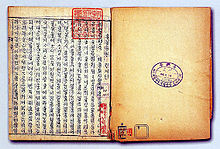Hong Gil-dong
|
|
|
| Korean spelling | |
|---|---|
| Hangeul | 홍길동 |
| Hanja | 洪吉 童 |
|
Revised Romanization |
Hong Gil-dong |
|
McCune- Reischauer |
Hong Kiltong |
Hong Gil-dong is a classic fictional character from the Korean folk tale , The Story of Hong Gil-dong ( kor. 홍길동전 , Hanja 洪吉 童 傳 , rev. Hong Gil-dong Jeon ), which was composed in the Joseon Dynasty . The author of this story was Heo Gyun , who probably wrote the story in the late 16th or early 17th centuries. The character is very similar to the British folk hero Robin Hood in that Hong Gil-dong was also famous for robbing the rich and distributing the booty among the poor.
The author Heo Gyun is now considered to be the author of the first Korean novel . He was born into the intellectual class of Confucian Korea. His half-brother Heo Sung was a famous poet at the time and his sister Heo Nanseolheon was one of the few female poets in Korea. Politically, for a long time he dreamed of an egalitarian social order without suppression by a hierarchy.
Hong Gil-dong is also a common placeholder name, like John Doe in the United States or Erika Mustermann and the average person in Germany.
The story of Hong Gil-dong
Because of the strict Confucian laws, Heo was forced to write down his political thoughts in this novel. Hong Gil-dong is born out of wedlock and is not accepted by his father. After his father learns from a shaman that his son is cursed, he tries to kill him, but fails. Horrified, Hong turns away from his father and goes out into the world to become a bandit leader. However, he only steals from the rich and distributes his booty to the needy. As a result, his popularity grew among the rural population, where he quickly rose to become a folk hero. The government under Yeonsangun tries to arrest him as a national traitor, but repeatedly fails. Ultimately, in order to keep him under control , he is offered the post of Minister of War , which he accepts. After a short time he begins to realize that in this position he cannot do anything about the problems of the population. In order to search for the truth, he goes to Nanjing . On the trip, however, he discovers the land of Yul-Do , which is oppressed by demons. He frees it from these and is there chosen to be king. When his father dies, although he wanted to kill him, he returns to Joseon to mourn his grave for three years according to tradition. Then he returns to Yul-Do to live happily as a king and hero.
Adaptations
The plot was adapted into a South Korean cartoon of the same name in 1967. A North Korean martial arts film, Hong Kil Dong , was released in 1986. Hong Gil-dong is also the name of a female bandit leader in the manga Shin Angyo Onshi . In the South Korean television is a television series ( K-Drama ) based on the story called Hong Gil Dong, the Hero broadcast, which started on January 2, 2008 at the station KBS2. In addition, there are numerous children's books , comics and computer games that adapt the material.
various
The largest South Korean military operation in the Vietnam War was named Operation Hong Gil-dong. The operation was a complete success and took place between July 9th and August 26th, 1967 near Tuy Hoa in South Vietnam .
literature
- Ch'ae, Un-jŏng / Kang, Mi-Sun: The Brave Hong Gil-Dong , ed. and over. by Woon-Jung Chei. Ill. By Mi-Son Kang; Yon-Kyong Kim, Seoul: Hollym 1999, 45 pages, ISBN 89-7094-253-X
- Elisabeth Hering: Hong Kil Tong and other fairy tales freely based on Korean motifs. Leipzig 1952
- Hong Kil Tong or the story of the boy who believed himself to be set back. In: Arnous, HG: Korea. Fairy tales and legends along with an introduction about the country and people, customs and traditions of Korea, German authorized translation, with 16 images. in the text according to the original photo U. the Korean. National coat of arms Leipzig: Verlag von Wilhelm Friedrich, [1896], online .
Web links
- Hong Gil-dong in the Doosan Encyclopedia (Korean)
Individual evidence
- ↑ Ju Brown (2006): China, Japan, Korea: Culture and Customs , p. 102 .
- ^ A Brief History of Korean Animation, Part II
- ↑ Hong Gil-dong in the Internet Movie Database (English)
- ↑ Wiki for the Manga . Retrieved November 3, 2013.
- ↑ Wiki for the South Korean television series . Retrieved November 3, 2013.
- ↑ Review of Events July 1967 (PDF file; 776 kB) on vietnam.ttu.edu from August 20, 1967 (English).
